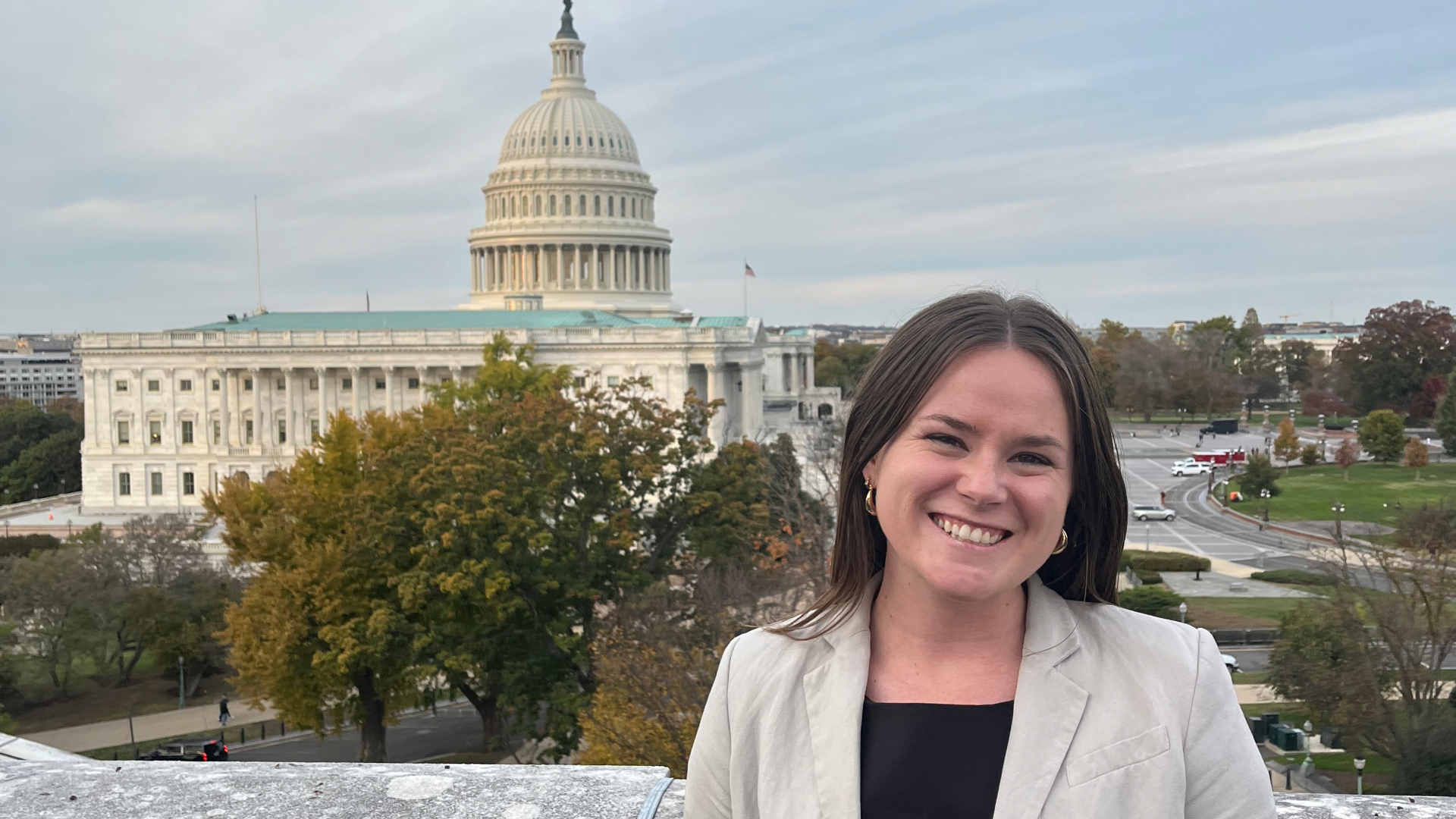From UMD to Capitol Hill: How a History Degree Helps Shape a Political Career
July 31, 2025

A Q&A with history and government and politics grad Rachel Jessee ’22.
By Jessica Weiss ’05
Rachel Jessee ’22 always knew she wanted to work in government. But it was her history degree from the University of Maryland that gave her the skills and perspective to truly thrive on Capitol Hill. Today, she works in operations for Democratic congresswoman Sarah Elfreth, managing a packed schedule and helping connect constituents and stakeholders across the state.
We recently spoke to Jessee about her time at UMD, her research into civil rights on Maryland’s Eastern Shore, and how studying history continues to shape the way she sees the world.
Why did you decide to add history as a second major in addition to government & politics?
I knew going into college that I wanted to work in government. Before college, I had done work at the state level and while I was in college, I did two internships at the Maryland State House and I also worked on Capitol Hill. But history was always something I loved. My family’s the kind that goes to places for their history on vacation. We’d go to Philly and do the heritage tours. And my sister, who also graduated from Maryland, majored in history before commissioning into the Air Force. So I kind of followed in her footsteps. History was something I really enjoyed. I never felt like I had to force myself to read for class—I wanted to.
Were there any history faculty who had a lasting impact on you?
I had amazing professors. I remember thinking, “This is incredible that I get to learn from these people.” Dr. Katarina Keane especially was so influential for me throughout college. She was my advisor for both my senior thesis and my internship on Capitol Hill, where I worked for Senator Ben Cardin. I took a few of her classes, including one on the history of sex and gender in U.S. history and another on gender and politics. She helped show me that you can really use your history degree in different ways.
Tell us about your senior thesis.
I focused on the civil rights movement on the Eastern Shore, where I’m from. I wrote about how local and national organizers worked together—and sometimes clashed—and how that dynamic played out. The Cambridge Nonviolent Action Committee was a civil rights organization formed in the early 1960s by Black residents and led by the activist Gloria Richardson, one of the first female leaders within the Civil Rights Movement. I was in touch with Richardson’s family and looked at how her story had been passed down. It helped me look at my hometown in a different way and get to know its complicated history.
Before that, I also did a paper on the “Talbot Boys” statue, a Confederate statue on the Eastern Shore in Maryland that was created to memorialize the 84 men from Talbot County who fought for the Confederacy during the Civil War. While I was writing it, the statue was actually being taken down. That was powerful—to be researching something as it was happening. That paper was published in Janus, the undergraduate history journal, and it's still something I’m really proud of.
What skills from studying history do you use in your job now?
Research, for sure. I can't tell you how many times in a meeting someone says, “Find this statistic” or “When did this happen?” Sometimes it's a quick search, but other times you need to really dig. Through my thesis work, I learned how to get into the nitty-gritty and find those important pieces of information.
Also, organization. When you’re doing a big research project, you have to figure out how to manage all that information—how to structure it, highlight key points, keep it all in line. That’s something I do every day at my job. I always say, if I’m not organized, then everything else is going to be a mess.
Does your history background shape how you see what’s happening today?
A hundred percent. It might sound cliché, but learning from the past to change the future is real. I see it all the time in my job—especially when people who've been on the Hill for 20 years say, “I remember when this happened, and here's what I’d do differently.”
It’s also helpful when you're seeing things erased or rewritten. There are conversations that are getting swept under the rug, and it's important to keep talking about them. As we look at how land is used or why buildings are named what they are, knowing the full story—how and why those choices were made—really matters.
What advice would you give to students interested in politics or public service?
Networking is huge. Reach out to people! Ask for a coffee. It can really open your mind to new opportunities and jobs and be helpful in ways you can’t even imagine.
Also, ask your professors questions. Pick their brains. They have such valuable networks and experience. And use all the free resources UMD offers—like career advising. I had someone at the University Career Center @ ARHU review my LinkedIn and resume before I graduated, and it was so helpful. I wish I had done it earlier.
What would you say to students thinking about pursuing a history degree?
I’d say that a history degree gives you writing, research, critical thinking and communication skills—those are all things I use every single day. My sister's in the military with a history degree. I’m working in government. You can do a lot with it. People don’t always realize how transferable those skills are.

